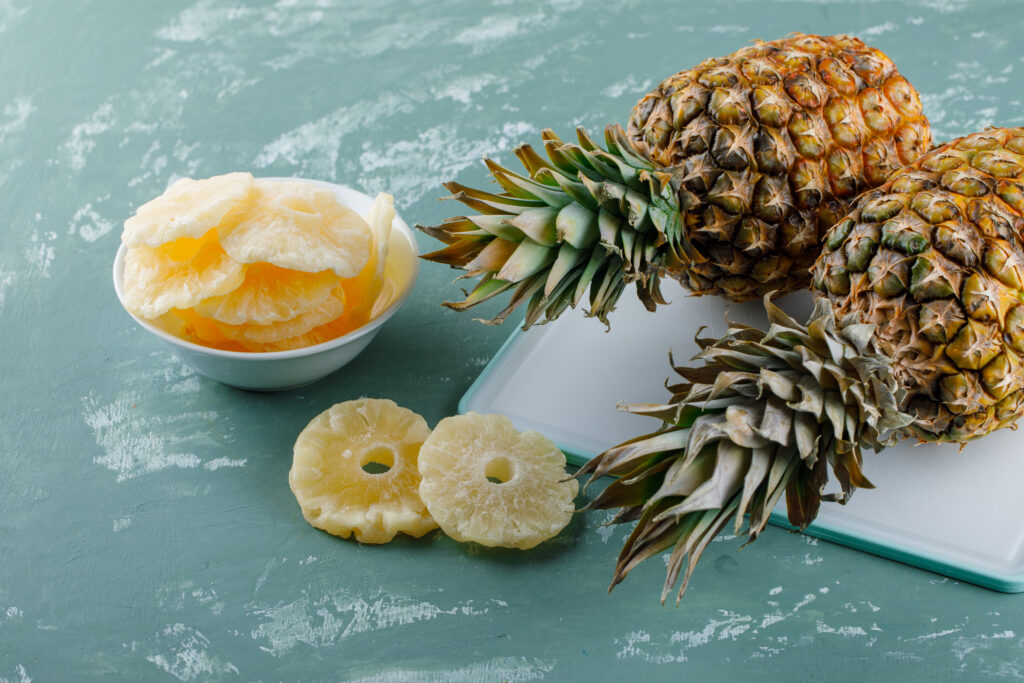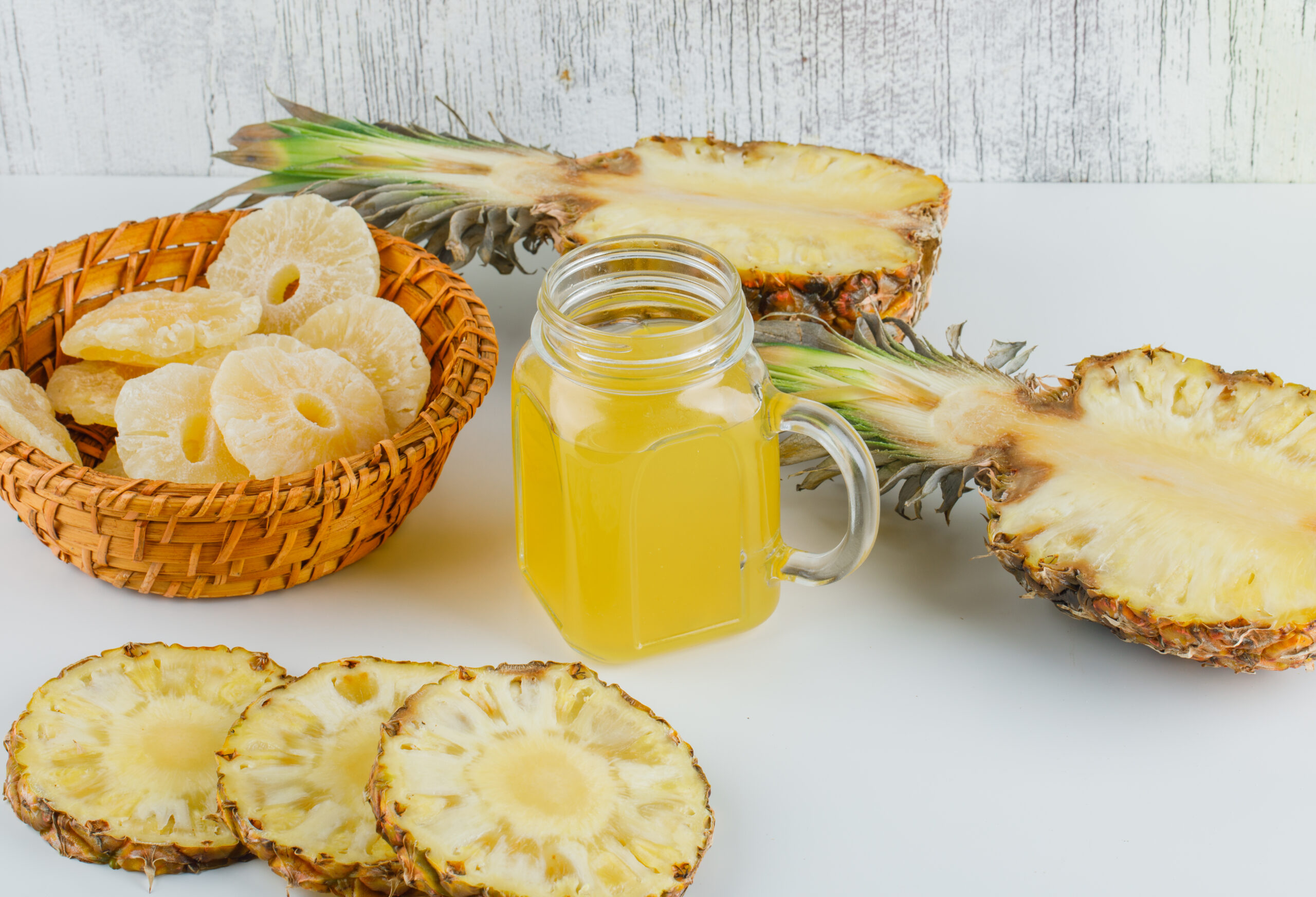Here we are going to share information on the topic “Exploring the Health Benefits of Quercetin with Bromelain.” It’s more crucial than ever to preserve optimum health in the fast-paced world of today. In order to promote their well-being, people are increasingly turning to natural therapies as oxidative stress and inflammation-related disorders rise in prevalence. Quercetin, a strong antioxidant present in a variety of plant-based diets, is one such treatment that is receiving notice. We’ll examine the many health advantages of quercetin and its interesting world in this post.

Exploring the Health Benefits of Quercetin with bromelain
What is Quercetin?
Flavonoids
Flavonoids are a class of chemicals originating from plants, including quercetin, and are well-known for their anti-inflammatory and antioxidant capabilities. Foods high in it include citrus fruits, leafy greens, berries, onions, and apples. Researchers and health enthusiasts alike are interested in quercetin because of its outstanding health-promoting properties.
Quercetin is a potent antioxidant
Quercetin is a potent antioxidant that scavenges dangerous free radicals from the body and shields cells from oxidative damage. Quercetin helps reduce inflammation and oxidative stress, which are fundamental causes of many chronic diseases, such as cancer, heart disease, and neurological disorders. It does this by neutralizing these unstable chemicals.
Anti-Inflammatory Properties
Quercetin has strong anti-inflammatory qualities in addition to its antioxidant benefits. It lessens inflammation all throughout the body by assisting in controlling the body’s inflammatory response. This makes quercetin a potentially effective natural treatment for diseases including inflammatory bowel disease, allergies, and arthritis that are marked by persistent inflammation.
Support for the Immune System and Allergic Relief
Research has indicated that quercetin helps the body’s defences against allergies and infections. Because it inhibits the release of histamine, allergy symptoms such as sneezing, itching, and nasal congestion may be alleviated. Quercetin supports immunological function, which helps the body resist infections and allergies.
Benefits for Heart Health
Research indicates that quercetin may be good for heart health. It lowers cholesterol and blood pressure and improves blood vessel function, all of which minimize the risk of heart disease. Quercetin supports overall heart health and longevity by fostering cardiovascular wellbeing.
Potential for Cancer Prevention
Recent studies suggest that quercetin may have anti-cancer effects. It may be used as an adjuvant therapy in the prevention and treatment of cancer since it shows inhibitory effects on the growth and proliferation of cancer cells. To completely understand quercetin’s involvement in cancer prevention, more research is required.
What is the term for bromelain?
- One class of enzyme known as a proteolytic enzyme is bromelain. Both pineapple juice and pineapple stems contain it.
- The body produces chemicals that reduce pain and swelling when exposed to bromelain. Additionally, bromelain has compounds that appear to decrease blood clotting and interfere with tumour cells.
- Bromelain is used to treat burns, kidney stones, tight muscles, discomfort, and a host of other ailments; however, there isn’t any solid scientific data to back up these claims.
- Bromelain should not be confused with other proteolytic enzymes, often known as proteases, including trypsin, chymotrypsin, ficin, papain, and serrapeptase. These aren’t interchangeable.
Why is quercetin taken by humans?
Quercetin is taken by people to try to treat a number of conditions, such as heart and vascular disorders.
- Bringing down blood pressure
- Infections of the prostate
- Keeping the upper respiratory tract free
- Preventing Allergies and Diseases
Mixed results have been seen in an early quercetin study on heart and vascular disease. While some study findings are conclusive, others are debatable. For instance, eating a lot of foods high in quercetin has been linked by researchers to a lower risk of heart-related mortality in older men. However, other research is not as strong.
Oral quercetin doses may lessen prostate infection pain, according to some research.
- Some athletes use quercetin in an attempt to boost their endurance and enhance their athletic performance. While research on animals shows promise, there may not be much of an impact on humans. The ability of quercetin to help prevent infections such as colds or upper respiratory infections during strenuous exercise may be one of the main advantages for athletes using it.
- Some studies correlate a diet high in quercetin with a reduced risk of cancer. However, more investigation is required. Although cancer research in animal models has shown promise, human trials have not yet yielded positive results. The current meta-analysis focuses on ovarian cancer and indicates no noticeable advantage.
- Furthermore, studies suggest quercetin may be able to lessen chronic inflammation and possibly even help prevent diseases like cancer and heart disease. According to research, it accomplishes this by keeping dangerous cells from accumulating within the body.
- Animals or cell cultures have typically been the subject of a large portion of quercetin research. To validate quercetin’s safety and advantages in humans, particularly when taken as a supplement rather than in food, more research is required.
- Oral dosages of up to 500 mg twice a day are typical. Lower dosages have also been employed by others. For each given ailment, quercetin’s ideal dosages have not yet been determined. The active ingredients and quality of supplements might differ significantly between manufacturers. It is challenging to determine a standard dose as a result.
Advantages of quercetin for skin
- Indeed, quercetin is able to reduce the redness, irritation, and inflammation of damaged skin; it may also help restore skin barrier function, boost hydration, and lower water loss.
- Bromelain and quercetin together for cough
- Supplements containing quercetin and bromelain can help your immune system. combining vitamin C with two potent plant-based compounds.
- Vitamin C shields cells from oxidative damage and boosts immunity.
Is quercetin naturally found in food?
Foods and the natural world are rich in quercetin. Food usually provides 5 to 40 milligrammes per day for an individual. However, you can obtain as much as 500 milligrammes each day if you eat a lot of fruits and vegetables.
When you pour a glass of red wine, bite into a crunchy apple, indulge in some berries, flip a buckwheat pancake, chop an onion, or drink a cup of green tea, for instance, consider the term “quercetin.” Several other veggies that are rich in quercetin include:
- Kale
- Tomatoes
- Broccoli
- Raw Caprese Slices
- uncooked red onion
- Seeds and nuts
- Olive oil
- crimson raisins
- Cherries
What dangers come with using quercetin?
It’s probably safe to consume quercetin as food. If you take quercetin as a supplement in sensible doses for a brief period of time—for example, 500 milligrammes twice a day for 12 weeks—it might be safe. Longer-term use carries unknown dangers.
Adverse consequences.
Quinine may give you a headache or tingle down your arms and legs. If you receive IV quercetin treatment, you can experience additional side effects (intravenously).
Risks.
High doses may cause kidney damage. Avoid taking supplements containing quercetin if you are expecting or nursing a baby. Considering how common quercetin is in food, you might consume too much of it.
Interactions.
If you are taking medications that are altered by the liver, such as warfarin, cyclosporine, or antibiotics, use caution. Quercetin may alter the mechanism of action and increase the chance of adverse effects.
Quercetin doesn’t seem to interact with foods, other herbs, or supplements in any way.
Supplements are governed by separate regulations by the FDA from “traditional” meals and medications. No matter how natural the supplements are, be sure your doctor is aware of everything you take. In this manner, your doctor can investigate any possible interactions or negative effects with diet, medicine, or other herbs and supplements. They are able to inform you if taking the supplement could increase your risk.
Whoever says quercetin shouldn’t be taken by
Kidney damage can result from extremely high quercetin dosages. It’s advisable to occasionally stop taking quercetin. Quercetin should not be taken by those with kidney illnesses, expectant mothers, or nursing mothers. There have been instances of renal injury at doses greater than 1 g daily.
Frequently asked questions
Is it OK to take quercetin daily?
Kidney damage can result from extremely high quercetin dosages. It’s advisable to occasionally stop taking quercetin. Quercetin should not be taken by those with kidney illnesses, expectant mothers, or nursing mothers. There have been instances of renal injury at doses greater than 1 g daily.
Is quercetin anti aging?
Quercetin may offer anti-aging benefits, according to reports (31, 40–43). Nevertheless, the signalling pathways are entangled, and the processes by which quercetin performs these actions are intricate.
Which food is highest in quercetin?
Of all dietary sources, capers contain the highest naturally occurring content of quercetin, earning them the moniker “superfood.” These edible flower buds are used to make Mediterranean delicacies like pasta sauces and shellfish; they are pickled or brined before consumption.
Does ginger contain quercetin?
In the present investigation, both ginger types exhibited high levels of quercetin, a flavonoid. Furthermore, it was discovered that Halia Bara leaves grown under 310 μmol m2s1 with a low photosynthetic rate had a greater content of quercetin (1.12 mg/g dry weight).
Is it safe to take quercetin and bromelain daily?
Quercetin is typically combined with vitamin C or bromelain in supplements to increase efficacy and absorption. To receive the health-protective benefits, the majority of people can begin taking 500 mg of a supplement and work their way up to 1000 mg per day, according to Shapiro.
What are the benefits of quercetin and bromelain together?
A daily dose of 1000 mg quercetin, along with 1000 mg vitamin C and 100 mg bromelain, was found to significantly lower ferritin levels and boost platelet and lymphocyte counts in research by Onal et al. (2021).
What is the difference between quercetin and quercetin with bromelain?
However, quercetin is a poorly absorbed nutrient since it is not soluble in water. Both vitamin C and the protein-digesting enzyme bromelain, which is taken from pineapples, improve the absorption of quercetin. As a result, quercetin is usually offered in combination with one or both of the additions.

Conclusion
Quercetin is a unique substance that has many different health advantages. With qualities ranging from immune system support and heart protection to anti-inflammatory and antioxidant capabilities, quercetin provides a natural way to enhance general health and wellness. Including foods high in quercetin in your diet or taking supplements of the herb may help you take advantage of its medicinal properties and maintain a healthy lifestyle. Accept the power of quercetin and enjoy the health advantages of this powerful antioxidant found in nature.
So, this is how the topic “Exploring the Health Benefits of Quercetin with bromelain ” has been addressed.
For more information related to these topics,
You may also visit our Instagram page by
Thank you!

